Baku. 24 October 2016. REPORT.AZ/ Interview of "Report" news agency with the newly-appointed Ambassador of Romania to Azerbaijan Dan Iancu.
- What are your impressions about Azerbaijan and how do you assess our bilateral political ties?
- I arrived in Baku just 3 weeks ago and I am still discovering, with each day, new and impressive things about the country, about its beauty and potential. I drove to Baku from Bucharest and, entering Azerbaijan, I witnessed along the road hard-working people bringing home the bountiful harvest. I was of course impressed by the beauty and modernity of Baku, but also by the kindness and hospitality of the people on the street, who are eager to help you despite language barriers. And I could also witness the passion of the people: it is said that Azerbaijan is the Land of Fire, but there is also fire - fire in a good sense - in their souls. I could feel this passion from my first experience at the Olympic Stadium in Baku, in the night of the historic victory of Azerbaijan football team against Norway in the FIFA 2018 qualifiers.
As you know, there is a very close friendship between Romania and Azerbaijan. I am proud to recall the fact that Romania was the second country, after Turkey, to recognize the independence of Azerbaijan.Since then, our bilateral relations have grown in strength and depth. Moreover, since 2009, these relations are developing within the framework of our bilateral Strategic Partnership. Over these past 25 years, there were, if I am not mistaken, eight visits of Romanian presidents to Baku. President Ilham Aliyev visited Bucharest five times. In June 2015, the Romanian Prime-Minister was in Baku, attending the opening ceremony of the 1st edition of the European Games. Our two countries enjoy extensive dialogue and cooperation between Parliaments, between the Ministries for Foreign Affairs, as well as between other governmental bodies. Moreover, we have laid solid grounds for the cooperation in the economic field: during the past four years, there has been a steady increase of the bilateral trade turnover. People-to-people contacts are also expanding. We have an excellent starting point, but we also have a lot of work ahead in order to make the best out of the actual potential of our two countries.
- As you have just mentioned, the trade turnover between Romania and Azerbaijan has increased during these last few years. Did the economic slowdown affect our cooperation in the economic sphere?
- Indeed, our bilateral trade has been on an upward trend in the last period and Azerbaijani companies are increasing their presence on the Romanian market. This is testimony to the existing potential to which I was referring earlier. Our economies are complementary, so we need to do our best to strengthen, develop and expand the cooperation into other fields of the economy. There is a need for long-term sustainability as far as our economic cooperation is concerned and I am confident that the ongoing efforts towards the diversification of the Azerbaijani economy will provide both our countries with more opportunities that we may develop jointly in the years to come.
- Romania and Azerbaijan enjoy good cooperation in oil and gas spheres. Are there any updates on AGRI project and how do you assess the work of SOCAR in Romania?
- Energy is a key part of our cooperation. We fully recognize and attach great importance to the role of Azerbaijan in strengthening Europe’s energy security. For my country, energy diversification is very important. Romania and Azerbaijan are strong supporters of the AGRI LNG interconnector ( AGRI stands for the Azerbaijan-Georgia-Romania Interconnector – reporter note) which is exactly the kind of project that could contribute to strengthening both energy security and energy diversification in Europe. In June 2015, energy ministers from the partner countries, among them the Ministry of Energy of Azerbaijan Mr. Natig Aliyev, met in Bucharest for talks on the AGRI initiative and issued a political statement reconfirming the support for this important project. The AGRI project will become even more relevant if we think of the investments underway within the EU, aimed at boosting the connectivity and strengthening the European energy market, such as the Bulgaria-Romania-Hungary-Austria interconnector.
Speaking of energy, right before leaving Bucharest, I had a meeting with the management of the Romanian branch of SOCAR and I was glad to hear excellent news. SOCAR is developing rapidly and steadily its activities in Romania. They have so far opened 34 petrol stations throughout the country and planning to expand even more. The company has reported yearly profits since they penetrated the Romanian market. They are creating jobs and making meaningful investments and I am pleased to say that SOCAR is already a well-known, respected brand in my country. We are looking forward for SOCAR to strengthen its presence in Romania.
- As Azerbaijan economy enters the post-oil era, how does Romania plan to assist Azerbaijan in developing the non-oil economic branches?
- Romania also went through its own transition process, from planned to market economy, so we know that large-scale restructuring policies are demanding and complex. Maybe some lessons from our experience – be it good or bad (and sometimes you learn more from mistakes!) – can be relevant and useful for Azerbaijan in the process of economic diversification. We are ready to share our experience with the pitfalls and difficulties of restructuring state-owned enterprises, but also with developing new and modern economic sectors, from IT and biomedicine to automotive and pharmaceutical products. We have also a long tradition and strong manufacturing base for machinery and technologies for sectors relevant to Azerbaijan – such as drilling. We hope that, through our joint efforts, the Romanian companies will bring an active contribution to the diversification and strengthening of the Azerbaijani economy.
- Romania is also a major partner of Azerbaijan in the military field. For the last eight years, Romania has held four consecutive mandates of NATO Contact Point in Baku. Can we expect a new mandate?
- Since January 2009, the Romanian Embassy in Baku has assumed the mandate of NATO Contact Point in Azerbaijan. I believe this is the longest period an Allied diplomatic mission has held this position – and I am not talking only about Azerbaijan. I highly appreciate the dedicated work of my two predecessors who, closely with the Azerbaijani partners, have done an excellent job in the field of public diplomacy, helping to strengthen the cooperation between NATO and Azerbaijan, promoting values shared by NATO countries and raising awareness about the Alliance here in Azerbaijan. All these efforts stand testimony to the importance NATO attaches to developing the dialogue and cooperation with Azerbaijan and reflect the strategic role and value of Azerbaijan, fully recognized by the Alliance. Our current mandate ends in December 2016 and another Allied State will take over. But we will remain fully involved in supporting the next Contact Point embassy in strengthening the NATO-Azerbaijan dialogue.
- As Romania is not a part of Schengen zone, are there any bilateral discussions on the visa facilitation issue? Can you give us a number of the Azerbaijani citizens who visited Romania in 2015 and 2016?
- Let me clarify a bit the question. It is true that Romania is not yet part of the Schengen area; nevertheless we apply all Schengen rules and already fulfill all technical and political criteria for joining the Schengen space. As you know, there is a single EU policy and a single legal framework regarding visas for third countries’ citizen. Romania, as an EU member state, adheres fully and strictly to this policy and this legal framework. Our visa policy applying to Azerbaijan is framed, like for all other EU Member States, by the EU-Azerbaijan Visa Facilitation Agreement, concluded and signed in 2014. And I can tell you that we have had an excellent collaboration with our Azerbaijani partners in implementing this agreement, which contributes also to the strengthening of the people-to-people contacts between our countries. I am also glad to recall the fact that, in the first part of this year, a bilateral agreement on visa exemption for holders of Azerbaijani service passports has entered into force. Overall, we expect the number of visas issued in 2016 to be about 400-500, for Azerbaijani citizens who go to Romania for scientific, research, education and tourism purposes.
- What is Romania’s position regarding such issues like migrants’ flow into Europe, the lack of confidence between EU member states, the terrorist threat? How can Azerbaijan and Romania cooperate in areas like migration management and counter-terrorist operations?
- We believe that migration and terrorism are two separate phenomena. Therefore, they have to be treated as such and tackled separately, in different formats and with different tools. As far as migration is concerned, Romania believes that a comprehensive approach is needed, leading to common EU response and common EU solutions. In our view, three points are extremely important: first - consistency in implementing the internal measures already agreed at EU level; second – improving cooperation with third countries (both of origin and of transit) and last but not least – strengthening the security of EU’s external borders. It is important to achieve progress on all three elements. What is also relevant, when talking about migration, is to tackle the roots causes, not just to find ways to deal with the consequences. The EU needs to work closely with the countries of origin and transit to find sustainable solutions to the challenges of migration and, in the process, to foster stability, development and prosperity.
- Are there any changes in the official position of Romania regarding the Nagorno Karabakh issue?
- Our position on Nagorno-Karabakh has always been clear and consistent. We support a peaceful, negotiated and comprehensive solution to all protracted conflicts in the CIS area, in full respect of the principles and norms of the international law, including respect for the territorial integrity and sovereignty of the countries. So, this is a long-standing position of Romania and this position remains unchanged.
- Do you have any plans to conduct Romanian cultural events in Azerbaijan?
- Our Embassy is currently working on an action plan for the next year, bearing in mind a few lines of action. First – we shall focus our efforts on introducing the Romanian traditions and culture to the Azerbaijani public, through artistic events such as cinema and music. Then, we would like to actively participate to the overall cultural calendar in Azerbaijan. Take, for example, the Baku Jazz Festival – it is a prestigious event, enjoying worldwide popularity. We are also thinking about traditional folk arts and crafts which highlight the similarities between our two cultures – such as carpets. I was amazed to see how closely some of the patterns in the Azerbaijani carpets resemble motifs which you can find on Romanian carpets, and this is something that we would be happy to bring to the attention of the local public.
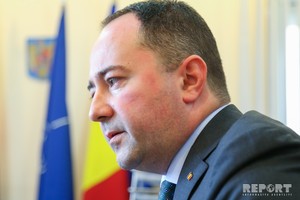
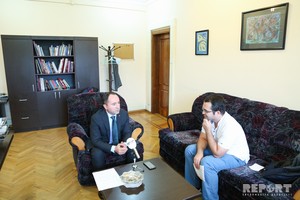
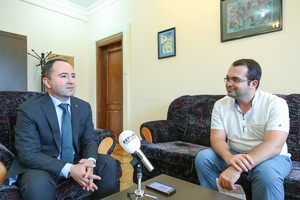
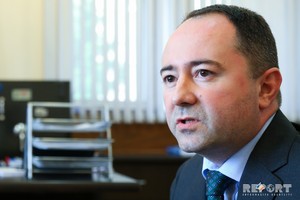


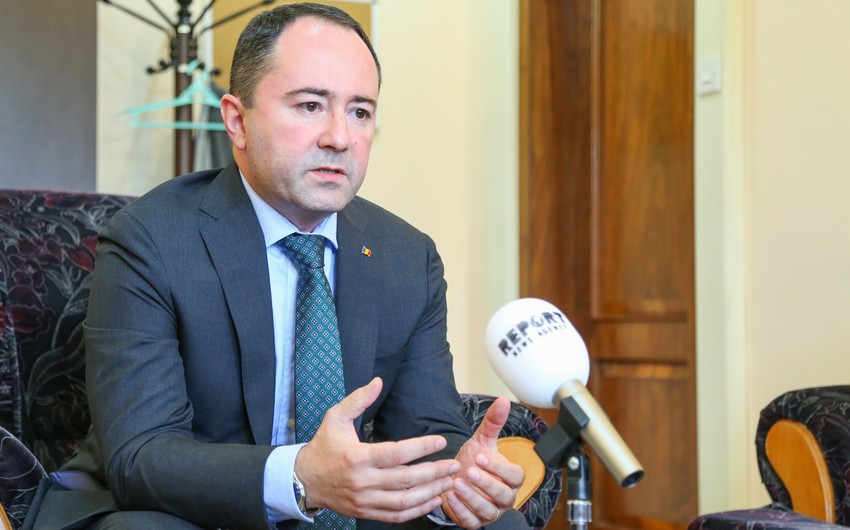 https://static.report.az/photo/0873ff78-b1bc-45b7-94df-9eb64e15e861.jpg
https://static.report.az/photo/0873ff78-b1bc-45b7-94df-9eb64e15e861.jpg

